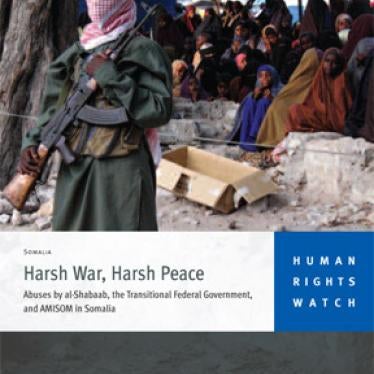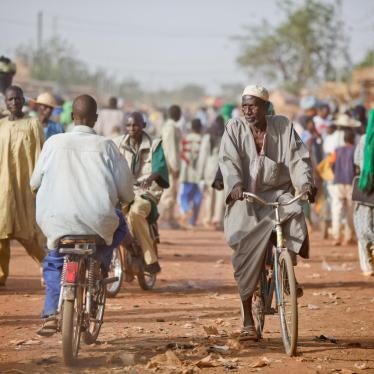As with most mortar attacks in Somalia, the shelling that turned 14-year-old Abdi into a war orphan struck without warning. Returning from school one day in the shattered capital of Mogadishu, the boy found his house blasted to bits and his parents dead beneath the rubble.
"I think my four brothers were killed as well - I saw pieces of their hands and legs," Abdi told me when I met him in the sprawling Dadaab refugee camps in northeast Kenya last October, two weeks after the attack. "I am in such shock I barely know who I am."
Abdi was emaciated. He walked with a list and spoke in a monotone. A wound festered on his head from a separate mortar attack that had hammered a Mogadishu market a month earlier. Three friends he had been playing with in the market were killed in that strike.
Stories like Abdi's are shockingly routine in war-ravaged Somalia, where the feeble U.S.-backed Transitional Federal Government (TFG) is pitted against powerful insurgents, primarily the radical Islamist group al-Shabaab. All sides to the fighting - including al-Shabaab, the TFG, and African Union Mission in Somalia (AMISOM) troops dispatched on a UN mandate to protect the transitional government - are firing indiscriminately into civilian areas of Mogadishu, killing people like Abdi's family and friends.
Bad as it is, the bloodshed could soon increase, as TFG forces - currently pinned by the Islamists in a sliver of Mogadishu - struggle to mount a new offensive to take over the capital. The United States and the European Union have made efforts to advise and train TFG troops, but the rebel forces, so far, are simply more effective. Unless international actors take firm measures to curb the TFG's and AMISOM's abusive military tactics, the result of the new initiative could just be more pointless civilian deaths.
The United States and its allies have their own national security reasons to be concerned about al-Shabaab, which has seized much of southern Somalia and Mogadishu since late 2008. Although the group contains numerous factions with varying ideologies and has never staged an attack outside Somalia, some of its leaders have ties to al Qaeda. Hundreds of foreign fighters have joined its ranks, including members of the Somali diaspora from places as far-flung as Australia and Minneapolis. The group's trail of destruction includes several deadly al Qaeda-style suicide bombings, including one on a medical school graduation ceremony in December that killed at least 22 people.
But beyond the security question of whether al-Shabaab might turn Somalia into a terrorist safe haven or wreak havoc abroad, the group's repressive measures against the Somali people are already cause for alarm. When Human Rights Watch (HRW) interviewed newly arrived Somali refugees at the Dadaab refugee camps and in Nairobi, the refugees spoke of al-Shabaab decapitating people it deemed to be spies and apostates, stoning adulterers, and amputating the limbs of thieves. Justifying itself with strict interpretations of sharia law, the group has recruited child soldiers, banned music and soccer, and barred women from work that brings them into contact with men.
One young man wept as he told me that al-Shabaab gunmen had shot dead his uncle for failing to reveal the whereabouts of his 15-year-old brother, who had deserted from an al-Shabaab militia. A woman described al-Shabaab enforcers throwing her into a shipping container and flogging her because she had failed to don an abaya - the head-to-toe gown that the group mandates for all women - before running out of her house to fetch her toddler from the street.
A war widow shook uncontrollably as she recounted how al-Shabaab members jailed her for a week and whipped her 185 times, doling out lashings during calls to prayer, for operating a tea kiosk in an area of Mogadishu controlled by the TFG. Her interrogator, a masked man with a whip made of an animal's tail, accused her of catering to government sympathizers.
"The whip had three strands and cut like a knife. I cried out in pain," the woman said. "I told him, 'I am not a government sympathizer. I am just a poor mother.... When people buy tea from my shop I cannot tell who is who.'"
From cell-phone ring tones to Western hairstyles, no detail is too mundane to escape al-Shabaab's scrutiny. One man from the southern port city of Kismayo described al-Shabaab jailing a group of teenage boys overnight and shaving their heads with a broken bottle; their crime was playing Scrabble.
As al-Shabaab imposes measures reminiscent of the Taliban on much of south and central Somalia, outside attempts to stem its rise have often been ineffective and at times devastating to the Somali people. The US and UN strategy has been to prop up the TFG at all costs, ignoring serious breaches of the laws of war by both TFG forces and AMISOM peacekeepers in Mogadishu.
US and UN officials have rightly condemned al-Shabaab for firing on the TFG and AMISOM from densely populated civilian neighborhoods -- usually so indiscriminately that they shell people and homes and only rarely military targets. But these same officials appear indifferent when the TFG or AMISOM forces respond in kind, firing indiscriminate mortar strikes on the neighborhoods from which al-Shabaab had attacked but had already fled, leaving civilians to face the onslaught.
Some of those mortars can be traced to the United States, which last summer shipped 40 tons of weapons to the transitional government after obtaining an exemption to a UN arms embargo on Somalia. But a portion of the weaponry intended for the TFG has ended up in Mogadishu's arms market and in the hands of al-Shabaab, according to credible security analysts and the UN Monitoring Group on Somalia.
The United States and its allies have also been largely silent on a covert Kenyan government campaign last fall to recruit Somali refugees from the Dadaab camps into a militia to fight al-Shabaab. An HRW investigation found that not only did the conscription contravene the civilian character of refugee camps, but the recruits were in many cases enlisted under false pretenses and some were clearly underage.
As foreign players embrace the TFG, Somalia, already one of the world's most troubled countries, continues its downward spiral. More than half the population urgently needs food and other emergency assistance, but the UN World Food Program has suspended food distribution to much of southern Somalia because of threats to humanitarian workers and concerns that deliveries are being diverted to al-Shabaab. More than 2 million people have fled their homes or sought refuge abroad.
Many Somalis already view the TFG, which was installed in 2004 with the help of the United Nations and the United States, as merely one more armed faction among the many. Abdi, the teenager who staggered into the Dadaab refugee camps, doesn't know whether the mortar attacks that killed his family and his three friends were the work of al-Shabaab or the TFG, but he fears both equally.
"For a time you will see al-Shabaab in control and then you will see the government in control," he said of his neighborhood in Mogadishu. "The only thing that doesn't change is the suffering of the people."
There is no quick fix for Somalia. But two senior U.N. officials made a good start today by urging an immediate halt to the recruitment and use of child soldiers by all parties in Somalia, not just al-Shabaab. Other major outside players should take their own first steps by promoting measures that would protect civilians, ending unqualified support for TFG and AMISOM troops that break the laws of war, and pressing for a UN commission of inquiry to investigate abuses by all sides in Somalia. And they should stop sending mortars and mortar rounds to TFG and AMISOM troops until these forces stop using the weapons indiscriminately.
Otherwise, more Somalis will end up like Abdi, viewing foreign actors as just one more group that causes them harm.






